* * * * *
For a number of years Emmett lived attending to his interests in Hollywood and not attracting public attention. This would change with the writing of his second book When the Daltons Rode, and his trip back to Coffeyville with Julia. In 1929 Bob Dalton also made an appearance!
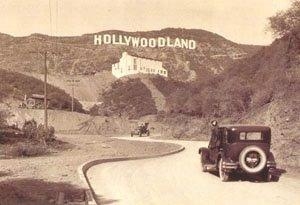
An article in the Real West, May 1976, recalled an incident involving Emmett in 1927, written by James H. Mulgannon, who at the time was a young police officer. Here is an abridged version of this article:
Two legendary figures lived not far from each other in Los Angeles during the third decade of this century. Wyatt Earp was 78 and had two more years to live. Emmett Dalton was in his mid-fifties and active as a building contractor with an office on North Commonwealth Avenue. This narrative deals with Emmett Dalton.
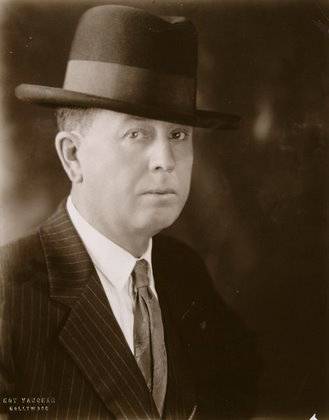
A motorcycle officer, Ben Mushaney, turned off his motor and walked into San Fernando’s small police station. Ben and I were discussing Referee Jack Barry’s long count on Gene Tunney when he was actually knocked out by Jack Dempsey.
The sound of an automobile was heard approaching. The engine quieted, and very shortly four hulking figures entered the small room.
I immediately recognized the leading person, William S. Hart, the old two-gun slinger of the Western silents. A second familiar face was Walter Scott, better known as “Death Valley Scotty,” a roly-poly sourdough. Man of mystery, it was rumored he had many secrets as to gold deposits in the north end of Death Valley.
In a breezy manner, Mr. Hart said, “Hello, officers! I’m down from Saugus-Newhall. Meet Mr. Dalton, Mr. Scott and Sheriff McCrabb from Coffeyville, Kansas.”
The handshaking being dispensed with, he said, “I have a favor to ask of you. We’re having an outdoor barbeque at my ranch and need some music. Do you know of any Mexicans with guitars who want to earn a few bucks?”
Ben spoke up. “Well, we can go down by the old mission and find out. Can we use your car?”
“Of course”, replied the western star. “I’ll go with you and leave my friends with your partner.”
Bill Hart strode out of the station in the company of Ben Mushaney. I was left with Hart’s friends.
Dalton spoke first. “As Mr. Hart told you, I am Emmett Dalton. Here’s my card [This card is now at the Dalton Defenders Museum in Coffeyville, see image]. If you’re ever in the city, I will be delighted to see you. The sheriff here is from my home town, Coffeyville. And you know Mr. Scott? He lives on the other side of the Sierras.”
I gulped hard in such august company. I tried to make conversation, and I failed miserably.
Scott and the sheriff were not given to conversation, but Dalton was free and easy. I felt comfortable talking to him. I still recall a soft midwestern quality that one attaches to a voice found in the Kansas-Oklahoma sectional.
Within an hour, Ben and Hart returned. Two middle-aged Mexicans, one with a guitar and the other with a mandolin, were seated in the rear of the limousine. A final shake of the hand, and the sedan with six passengers pulled away, crossed the Southern Pacific Railroad tracks and headed for Newhall-Saugus.
This article well illustrates Emmett’s unassuming manner and the ease with which he could make friends.
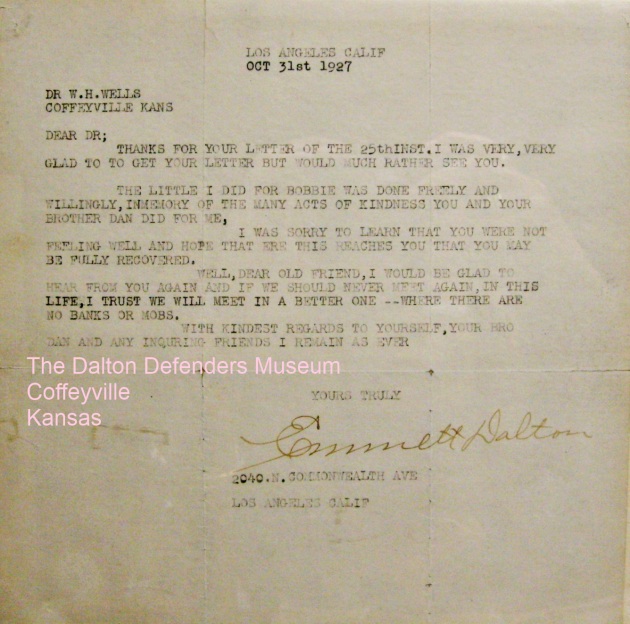
A letter from Emmett to Dr. Wells
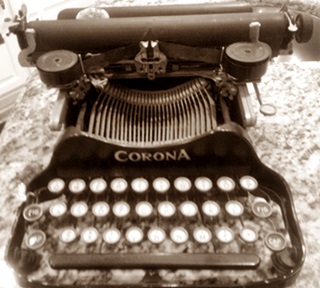
Emmett's typewriter
In 1928 Emmett was diagnosed with hypertension.
The Edwardsville Intelligencer, May 18, 1929: Watsonville, Calif., May 18 - Society which Bob Dalton once preyed upon as leader of the famous Dalton bandit gang, notorious desperadoes of the Texas Panhandle, Oklahoma and California in the late eighties, has joined to help him in his old age.
Dalton was recognized here by Arthur Dresser, who was a victim of the gang in 1891.
The gang leader is near death from consumption and has no money for hospital bills. He is 70 years old. Contributions wer eoffered by residents of the city to pay for medical treatment.
Dresser was a Wells Fargo agent at Hanford, Cal., when he was held up by the Daltons.
Ponca City News, May 22, 1929: If there is a Bob Dalton living in California, claiming to be a member of the old Dalton outlaw gang nearly forty years ago, then Bob Dalton, who was killed at Coffeyville, Kansas, on October 6, 1892, has come to life, according to Major Gordon W. Lillie (Pawnee Bill), who knew all the Daltons. Lillie says it is impossible for any of the Daltons to be in Watsonville or any other other California town, where press reports state funds are being raised to aid him in his old age.
“C. M. Scott, scout for the state of Kansas, and myself rode into Coffeyville, Kansas, just as the sun was sinking in the west on October 6, 1892,” says Major Lillie in giving a brief, interesting statement regarding the wiping out of the Dalton outlaw gang. “In the triangular square, on two cellar doors lay the remains of Bob Dalton, leader of the Dalton gang, and by his side Grat Dalton, his brother, Bill Powers and Dick Broadwell.
Emmett Dalton was lying on a cot in an empty store building, less than a square away, with his faithful mother and and several of the members, anxiously watching and waiting, and expecting every moment to be his last. …”
More living Bob Daltons were to emerge in various places. One of them later claimed to be Jesse James.
The Evening Tribune (Albert Lee, Mn.), June 27, 1929: Coffeyville, Ky., June 27 —(AP)— Old timers in Coffeyville were surprised to read that Jack Dalton, supposed member of the notorious Dalton outlaw gang, had been married in Albuquerque, N. M. to “Cattle Annie” Burke, his boyhood sweetheart. History records that Emmett Dalton was the only one of the Dalton boys to survive a pitched battle here in 1892 when the gang raided a bank. Grattin and Bob Dalton were slain by possemen.
Los Angeles Times, June 28, 1929: Admitting he was once an outlaw, but denying that that he is any relation to the Jack Dalton who married “Cattle Annie” Burke in an airplane at Albuquerque, N. M., Wednesday, Emmett Dalton of 1928 Hillhurst avenue yesterday declared he is the only living member of the Dalton gang of 1892.
“I don’t know this Jack Dalton and never heard of him before, but I do know he was not, as he says, a member of the Dalton gang,” said Mr. Dalton.
“The telegraph story in the Times says that in 1896 the Dalton gang was rounded up and sentenced to the penitentiary for robbing a bank at Coffeyville, Kan. The fact is that it was in 1892 that the gang, consisting of my two brothers and myself, a man named Powers and one named Broadwell, were rounded up, but all of them were shot excepting myself. I escaped, but was captured and sentenced to penitentiary for life.”
Mr. Dalton, who now is a contractor and builder, served fourteen and one-half years in prison for his participation in the Coffeyville robbery and then was pardoned by Gov. Hoch of Kansas.
“Today I have no more use for guns than I have for fakers, and it hurts my feelings to have friends calling me up and kidding me about my kinship with this Jack Dalton fellow,” said Mr. Dalton.
Los Angeles Times, July 1, 1929: What makes a hit with me is the magnificent disdain with which Mr. Emmett Dalton, the ex-outlaw, disowns one Jack Dalton. He says firmly, positively and indignantly that this bogus Jack did not have the honor of belonging to the “Dalton gang.”
Incidentally - if the police see a mob any of these mornings they should not be unduly alarmed. It will only be the Hollywood authors in hot pursuit of Emmett Dalton to get his “life story.”
The Oklahoman, Sept.1, 1929: HOLLYWOOD, Calif., Aug. 31. - (Special.) - From holding up express trains and banks in Oklahoma to dealing in Hollywood real estate is a far cry, but Emmett Dalton, only surviving member of the famous Dalton gang, who is now a quiet, law-abiding citizen residing at 1928 Hillhurst avenue, says it is an agreeable change - and a profitable one.
The eyes of the once frontier desperado, that were trained to look down a barrel of a rifle at a quaking bank official or through ambush at an approaching mail train, now watch the rapid multiplication of new homes here and rising prices of land values with a brighter gleam of satisfaction than ever marked them in the exiting days of the early nineties.
Dalton, quiet-voiced, mild mannered, and unassuming can remember the days when his name was used by mothers to hush crying children, when the family cognomen was uttered everywhere in a whisper. Dime novels have glorified the exploits of him and his two brothers. Many accusations have been made against him. These he accepts philosophically. But he does want it undrestood that there are no Dalton graveyards around Los Angeles.
Newspapers last week told of police detectives uncovering a site 839 West Ninth street and finding old bones. The opinion was expressed by detectives that the bones might be the remains of a victim of the Dalton brothers.
“Ridiculous,” said Dalton. “I traveled with my brothers during all their raids and I know this is untrue. Yes, we roamed some in California, but we never lived in Los Angeles.We have been accused of holding up a train near Tulare in 1890, but never of any depredation in this city.”
Dalton recalled how the gang came to grief in Coffeyville…
After 14 years he was pardoned. That was 23 years ago. Emmett started all over. He began producing motion pictures in Oklahoma, and made a fair success of it. Then 12 years ago the California fever caught him and he came to Hollywood. He has lived here since, engaged in building work, and likes it.
“There isn’t such a thing as a successful outlaw,” the erstwhile bandit opined. “A man is a fool to try to beat the game. Crime never pays. The criminal plays a losing game. Anyone these days can make more money observing the laws than breaking them.”
In the gang’s four years of plundering in Missouri, Oklahoma and Kansas, it earned about $200,000, but the money was squandered. Their friends wanted loans. The money disappeared as fast as it could be taken from banks and railway cars.
“I will say that in those days we did have a code of honor,” said Dalton. “We never killed unless it was absolutely necessary. We were inspired by a belief that rich corporations were fleecing the poor people and that the law protected them, and so we only robbed the big corporations. We never shot unless it was absolutely necessary.
“I believe that there is nothing that so encourages crime as the belief that rich men and corporations are making illicit gains without being liable for punishment.”
Dalton said that the incident that pitched the brothers into their hectic career was the government refusal to pay Bob and Frat for a year’s services as United States marshals.
“I don’t think there is a crime wave today,” the former train robber said. “There are more acts penalized, and hence more laws violated, but there is no more crime. The thing that makes it appear so is that acts, formely permitted, are now penal offences. Naturally we have a greater crime record.
Dalton doesn’t recall all the depredation committed by the gang. One of the most daring, he said, occurred just three months before the Coffeyville raid.. On this particular occasion a train was held up at Adair, Okla., 11 guards and United States marshals held at bay, and $10,000 taken.
The Hollywood builder was born in Kansas City, and lived there during his early life. Incidentally, first cousins on his mother’s side were the Younger brothers - Cole, Jim and Bob - all notorious members of the Jesse James gang. Their raids were made at an earlier period.
“But that was a lawless age, and we were ignorant. If we had lived in this enlightened age, we would have known that such a career is a losing one,” Dalton went on. “There is a lot more money in honest trade.”
In 1930 Emmett had a book West of 96 published by Butterick Publishing Company. “96” referred to the meridian line that runs across Tulsa which used to be a rough boundary for the wilderness of the west. It is fair to assume that this was no big seller as he immediately went on to write another one (it is also possible that this was a reprint of Beyond the Law under a different title). This was done with the collaboration of Jack Jungmeyer, an experienced fiction writer. The title was much more informative When the Daltons Rode, and was about twice the length of West of 96. I think it was written pretty much tongue in cheek. By now Emmett knew he could tell, and be believed, just about anything, and gave people what they wanted rather than a true history. The mantle of an old-time outlaw was no longer shameful and he had learned to live with it. No longer did he stay with the horses during the train robberies, but was a full-blown outlaw. He did not even resist the Coffeyville raid. And, oh, he was dead cool in the First National bank. There was Abe Knott in the bank with a six-shooter in his belt (he was in the bank, but minus the gun). Emmett wrote: “I had learned from experience never to take my gaze off the other fellow in moments of danger, and never to give back a step. As I looked into his steady eye I felt that one of us might have to die.” Now, according to the Coffeyville Journal of the time, Emmett kept those in the bank in a state of nervousness by his swearing and the reckless manner in which he flourished his rifle. That does not sound so cool! But, under all the romantic nonsense, one can find some interesting insights. On the whole, the story line was that of the earlier Beyond the Law. The book came out in January 1931.
The Kingfisher Weekly Free Press, March 12, 1931: The following dispatch from Los Angeles, Calif., under the date of February 18, appeared in last Sunday’s Tulsa World: “Two thousand red-headed Texas Rangers is the only force needed to clean up Chicago with its racketeers and gangsters, in the opinion of Emmett Dalton, the youngest and only surviving member of the notorious ’Dalton boys,’ who roamed and ravaged the old Indian Territory.
“Yes sir,’ Dalton says, ’we’d sure tame that town. First thing I’d do would be to throw all ward heelers in mail and then with their backbones broken the gangsters and mob men would have to shift for themselves. The minute you take the official protection from those racketeers they’re through. They lose their ammunition.’ ’So you don’t think the present day crop of outlaws is a credit to the profession?’ he was asked. ’Outlaws, thunder!’ he indignantly corrected. ’Those fellows gunning around here now aren’t outlaws. We outlaws in the old days had some principle. We held up trains and banks that’s true, but we never shot anyone - unless he qualified, and it was absolutely necessary. But these gangsters today,’ he chuckled in derision. ’They even have bodyguards. Can you beat that? Imagine Jesse James or one of the Dalton boys with a bodyguard.’
“Despite his 60 years, 14 of which were spent in Lansing, Kan., prison for his part in the historic Coffeyville, Kan., robbery when eight people were killed, Dalton today is a splendid figure of a man. He is in real estate and building business and has written two books on outlaw life.”
In April 1931, Emmett and Julia set off in their automobile for a long tour of the country, which they called their second honeymoon. Emmett seems to have been in a fine form, full of chat, keen to quote stories from his book, and, of course, not forgetting to mention that crime is not really worthwhile. He was back in business!
The Wisconsin State Journal, April 18, 1931: FRESNO, Cal., - (U.P.) - There is no such thing as a successful outlaw.
Emmett Dalton, only survivor of the famous Dalton gang of the ’80s and ’90s, made that remark while on a visit here. Dalton, who paid for his part in the Dalton gang outlawry with 14 years in prison, today is a successful Los Angeles real estate man.
Dalton said he had made more out of a single real estate deal than was taken in all the robberies of the Dalton gang.
Abilene Daily Reporter, April 23, 1931: Crime doesn’t pay, no matter which way you look at it. A large part of the present crime situation is due to a faulty education given children by their parents and teachers.
This sounds like old stuff, but the man who said it makes it important. Emmett Dalton, last of the Dalton gang, ought to know.
Dalton, in Abilene today, went on to say:
“They taught us, and they still teach children, to look up to wealth and not the means by which it is obtained. A child forms the idea that it is the money that counts, and not the method of getting it.
“Teach them, instead, how by hard work and diligence one may obtain the better things of life. Teach them that character and honor are worth more than money.”
Dalton submitted his own life as the proof:
“I was born 60 years ago, May 3, 1871, and from the time I was big enough to carry a gun until they caught me at Coffeyville, Kas., October 5, 1892, my career was one of wild outlawry. In all that time the most money I ever had was $3,500, and throughout the long career of the Dalton and Younger boys our gross loot was not more than $60,000.
“Within the last five years, as a middle-aged man, I have made more than that. In fact, two land deals in Hollywood, Cal., brought me more money than our whole bunch ever made in deviltry - and for the $60,000 we got we paid a fearful price. I now have the satisfaction of a clear conscience.”
Dalton’s book, “When the Daltons Rode,” came off Doubleday-Doran Company’s presses January 30, and already has a large sale.
Accompanied by his wife, Dalton drove into Abilene this morning, bound east, and stopped over several hours for car repairs. He and his wife were playmates in childhood, in a day before the Daltons rode, both reared in the Cherokee Nation of Indian Territory, now Washington county, Okla.
Two brothers, Bob and Grat, were killed in the gun battle of October 5, 1892, following the raid on two banks of Coffeyville. Emmet got two rifle balls, 18 buckshot - and a life sentence. He served in the Laning, Kas., penitentiary 14 1-2 years, getting his pardon November 7, 1907. Since then he has been on the lecture platform, and quietly living in Hollywood.
Emmett Dalton actually is the last of two famous families, the Younger boys - John, Cole, Jim and Bob - being first cousins of the Daltons, although the Youngers were in outlawry ten years ahead of the Daltons.
“Our people weren’t all bad,” Emmett said. “There were ten boys and five girls in our family, which originated in Cass county, Missouri, and only four got into crime. No better man ever lived than my father. He served under Zachary Taylor in Mexico and with Sterling Price in the Confederacy.
I still shudder when I look back on the Coffeyville fight and remember that in the space of five minutes eight men were killed and four wounded, of whom four dead were citizens and two were my brothers, Bob and Grat. If I have any philosophy in life it is that every man is entitled to his life. I am bitterly opposed to capital punishment, feeling that in taking a human life the state is just as guilty as a private citizen shooting out his feud. If they want to go to the Bible and debate it with me, I will give them Christ’s words ‘I come not to destroy, but to save,’ - and I lack hell of a lot of being a Christian.”
Dalton, 60 next May 3, is quiet, low-spoken, slightly portly. His gray hair is thinning.
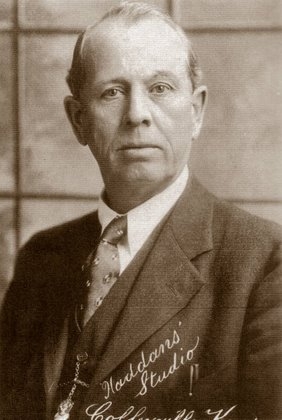
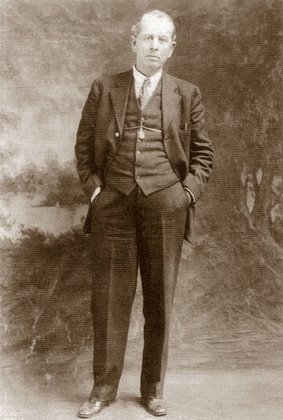
Dallas Morning News, April 25, 1931: Emmett Dalton, once the terror of bankers and railway expressmen, and the only survivor of the great Coffeyville, Kan., street fight of Oct. 5, 1892, Friday night sat on the mezzanine floor of the Hilton Hotel and talked of prospects of a revival in Los Angeles real estate, of whether book reviews in the Boston Transcript have more pulling power than those in the San Francisco Daily Chronicle, and of whether a double O in a man’s name such as in Hoover, Coolidge or Woodrow Wilson, is a sure sign that he’s headed for the White House.
Not that the last living hero out of the pages of the Wild West of forty years ago has gone soft. He still has memories of the days when the Younger brothers, the Dalton gang, and even Jesse James and Billy the Kid were current phenomena like Al Capone or Alfalfa Bill Murray today. His talk is filled with innumerable rattling good yarns of train robberies and bank holdups. And he also talks with sense and conviction about any present-day topic of public concern, from prison reform to prohibition. The only point is to show the amazing range of interests and knowledge he has acquired in one man’s lifetime.
Mr. Dalton’s interest in real estate is professional. He is a full-fledged realtor in the city of Hollywood, and during the last fifteen or twenty years has amassed a neat competence, so that he and Mrs. Dalton can make pleasant leisurely cross-country trips in their automobile such as the present one. He points out that he made more money a few years ago on two single lots in the movie capital than he and other members of the Dalton gang realized in all their depredations in the old Indian Territory. He recalls two definite holdups of express cars on the Katy Railroad and three on the Santa Fe.
But Mr. Dalton’s interest in book reviews is equally professional. He is the author of a current best seller,“When the Daltons Rode,” an excellently written, fast moving chronicle of his own youth. It was written in collaboration with Jack Jungmeyer, a well-known West coast feature writer, and is published by Doubleday, Doran. To judge from Mr. Dalton’s conversation, the language in the book is wholly his; racy, colorful and precise.
Mr. Dalton has little appreciation of the “big shots” of the underworld in American cities. No real Robin Hood adventurer ought to ride around in armoured cars, using machine guns and accompanied by press agents, in his opinion. He plans to continue to Oklahoma City Saturday afternoon and pay a visit to Governor Murray.
Kansas City Star, April 28, 1931: OKLAHOMA CITY, April 28. - Treasure seekers who believe fabulous amounts of gold and silver were buried in Oklahoma and Kansas by the Dalton gang may lay their picks and shovels aside.
Emmett Dalton, 60, last survivor of the band, who now is a prosperous real estate dealer in California, gave information to dispel the fortune hunters’ illusions last night.
“We never buried any treasure,” he said. “We needed all the money we collected for our own uses, or to lend to our supposed friends.”
Kansas City Star, April 29, 1931: Oklahoma City - Emmett Dalton, leader of the notorious Dalton gang that thirty-nine years ago was the terror of the Southwest, returned Sunday to revisit the scenes of his career as an outlaw.
The elderly man who arrived from California bore little resemblance to the “bad man” of Kansas and Oklahoma pioneer days. Prosperous from his earnings as a building contractor in California, Dalton is here to gather literary material and also to leave at the office of Governor Murray a plea against capital punishment.
Dalton will go to Coffeyville, Kas., where his four companions in the Dalton gang were killed on an October afternoon in 1892 in an attempted bank robbery, in which Dalton himself was seriously wounded. After serving fifteen years of an original life sentence in Kansas penitentiary, he went to California and gave up his career as a robber.
San Antonio Express, April 30, 1931: COFFEYVILLE, Kan., April 29. One of the old Dalton outlaw gang came back to Coffeyville today, but with good will - not guns.
Eight persons were shot to death Oct. 5, 1892, when Emmett Dalton, his brothers and associates paid a visit. But they came to rob banks and there was a sanguinary battle in the streets.
Grat and Bob Dalton were killed. So were their associates, Bill Power and Bill Broadwell. Four citizens also met death.
Today Emmett came to repair the graves of his brothers and to look upon the battle scene. As he stood at the site of one of the victim banks, a man who was 11 years old at the time of the battle, recognized Dalton.
“How do you do, Emmett,” said the man [E. W. Morgan], now a prominent real estate dealer.
Charles T. Gump, 72, also greeted Dalton, extending a hand that was wounded during the fighting and assuring the former outlaw that no ill will remained.
Only a piece of gas pipe, driven into the ground, marks the burial site of Grat and Bob Dalton and Bill Power. Broadwell’s grave is in Western Kansas.
The following week, in the Sunday issue, the Kansas City Star, carried a lengthy article on Emmett’s visit to Coffeyville. Get ready to cringe!
Kansas City Star, May 10, 1931: Emmett Dalton came back to Coffeyville the other day “to go over the old trails,” to meet some old-time friends and to fix the graves of his two brothers, “Bob” and “Grat,” killed in the Dalton raid here thirty-nine years ago.
With his wife, Emmett drove from their home in Hollywood, Cal., and arrived in the evening at the home of John B. Tackett, in Coffeyville. I met them there the next morning.
Emmett was at breakfast. He rose, six feet tall, “thin as a rail” and as [illegible word] as he was when a youth, and he rose to meet me, with his hand out…
This man, advancing across the breakfast room to meet me, attired in a dark blue suit of clothes, his trousers creased and with the bearing of a successful business man, was the last of those wild-riding outlaws whose exploits filled the newspapers forty years ago. It was hard to realize that this quiet appearing man had been the swashbuckling hero of a hundred dime novels, but he was.
“Why, you look younger than I ought to find you,” I said.
“I am young,” he answered, and he laughed. “I am only 60.”
“How is your health?” I asked by a way of beginning a conversation.
“Good, fine, except,” and he put up his left hand and grasped the sleeve of his coat above the elbow, “that old wound bothers me a lot. You know, at the Coffeyville raid here thirty-nine years ago someone planted a bullet right there in my arm. It shattered the bone some. The doctors wanted to cut the arm off, but I was only a kid and hot-headed, and I told them that if I was going to die, as they said I was, I would be buried all together. It has never healed. It is an open sore yet and I have to bandage it every morning. Outside of that I’m all right.”
John B. Tackett, at whose home Dalton and his wife were staying, had told me that Dalton was rich, that he and his wife went to Hollywood twelve years ago, just in time to get in on the upward rise of the real estate boom there. They bought land and built houses and sold them and made a lot of money. I asked Dalton, “They say you’re rich. Are you?”
“Well,” he drawled, in his soft, quiet, even tone of voice, “it depends on what you call rich. If you mean a million, we haven’t got it. But we are comfortable. One thing you can say, I’ve made more money in two or three years of real estate deals than the Dalton gang ever made in all years of our deviltry.”
“I’ve been in his home in Hollywood, and it’s a dandy,” interrupted Tackett. “Great big house, wonderfully furnished. Emmett’s rich. You can put it down.”
“Just say that whatever I’ve got I owe to my wife, the most wonderful woman in the world. Come here, Julia,” he called, and she came in, a refined and charming woman with graying hair.
“Is this Julia, the sweetheart of your boyhood you tell so much about in your book?” I asked Emmett.
“This is she,” he answered. “This trip we are making now is our second honeymoon. After we leave here we are going to drive to her old house in Oklahoma.” Later, as we stood at the graves of his brothers he said: “Did you ever read Longfellow’s Evangeline, that wonderful story of how a woman followed after the man she loved, searching for him all her life, from girlhood to old age, and those beautiful words of the poem:
Ye who believe in affection that hopes, and endures, and is patient,
Ye who believe in the beauty and strength of woman’s devotion,
List to this mournful tradition:
“Remember those lines? I committed them to memory when I was in the state prison. Well, all that Longfellow said of Evangeline’s love and devotion I can say about Julia’s. I owe all that I am to her.”
As Dalton and Tackett and I rode together toward the Coffeyville plaza, the scene of the robbery and street battle, I suggested that we go over the ground and review the events.
“…We all knew the danger of the job, to ride into a town in daylight, rob two banks and get away, but we joked and laughed as we rode in. A man is never scared at that point in the game. He has reasoned it all out before, made up his mind, and the closer he gets to the job the cooler he gets.
“We figured the chances were all in our favor. We would take the town by surprise, in two or three minutes we would have the money, and be on our horses and away before the town became aroused. …
“Charley Ball, the cashier, was a man of nerve and quick wit, and when Grat ordered him to open the money safe Bell answered it had a time lock, which would not open for ten minutes.
“ ‘All right,’ said Grat. ‘We can wait ten minutes.’
“The truth was, there was no time lock. The safe door could have been swung open easily and there was $18,000 in there, ready to hand. Had Grat tried the door of that safe he would have got that money and been out of that bank in a minute, and we would have got away before the town armed against us.
“In all my life I have never known an exhibition of chilled nerve such as Grat Dalton, Powers and Broadwell gave there, waiting, watching the minute hand of the big clock on the wall creep slowly around, counting the seconds, one minute, two minutes, three minutes, while the town armed itself and began bombarding the bank…
Considering they should have been out fast, it seems incredibly stupid to be prepared to wait for 10 minutes. In fact, according to the Coffeyville Journal of Oct. 7, 1892, the wait would have been three minutes. Some other versions of the story have it as ten minutes, or even twenty! Emmett uses the three minute version in both of his books.
“As Bob and I came up Eighth street to the corner of Union a grocer over there shouted to us: ‘You’re killing innocent people!’ I raised my rifle to bear on him and called back: ‘Get in there or I’ll give you some of it,’ and he scattered boxes of apples all over as he scrambled back into his store. …”
…There was a square burial plot marked only by a small stone at each corner, and a rusty iron pipe bent into an arc, with each end stuck into the ground. That was the top rail of the hitcing rack to which the bandits tied their horses the day of the raid.
“Poor Bob,” said Emmett. “He was the finest figure on horseback I have ever seen. He was the bravest, coolest man I have ever known, both as a United States deputy marshal and as an outlaw. Between Bob and me was a bond of wonderful affection, I would have died for him. There he lies.”
Emmett moved over a couple of feet to the head of another mound and said, musingly, as if no one was near: “Poor Grat. Here he sleeps, an aimless, discontented boy who grew into a fierce fighting man.”
“…I am the last survivor of the old-time frontier outlaw, and I, too, am doomed to die as all those others did, from a bullet, for this bullet wound in my arm will carry me off one of these days.” …
As we moved away Dalton said:
“I challenge the world to produce the history of an outlaw who ever got anything out of it except that,” and he pointed to the row of outlaw graves, “or else to be huddled in a prison cell. And that goes for the modern bandit of the skyscraper frontier of our big cities, too. The machine gun may help them get away with it a little better and the motor car may help them in making an escape better than to ride on horseback, as we did, but it all ends the same way. The biggest fool on earth is the one who thinks he can beat the law, that crime can be made to pay. It never paid and it never will, and that’s the one big lesson of the Coffeyville raid.”
Right the way through this tour of Coffeyville, everything Emmett said, most of it quoted from his book, had a feel of an act about it. He had fitted himself into the role of an old-time, cool outlaw (with a romantic side to him), and there seemed to be no genuine feeling in anything he said. But it looks like he enjoyed himself.
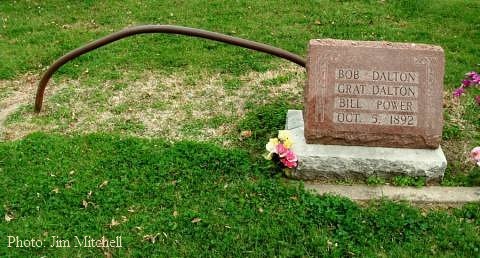
The bandits’ grave—Coffeyville, Kansas.
(This stone is a copy of the original, which was stolen. This one was also stolen in September 2010, but was recovered and now faces the opposite direction!)
San Antonio Express, May 4, 1931: FORT SMITH, Ark., May 3. - Emmett Dalton, last of the Dalton outlaw band that terrorized the Southwest nearly 40 years ago, returned to Fort Smith after an absence of more than 20 years, to find, instead of the roaring pioneer town he knew, a modern industrial city without even a pool hall open on Sunday.
Dalton came here to delve into records of the United States district court, to be used in a book he is writing. He is particularly interested in the period of the country’s history when “Hanging” Judge Parker and his “old soldier” jury administered stern justice to law-breakers. The frontier judge sentenced more than 20 men to hand on “maledon’s white mule” as the gallows that stood in the old Federal courtyard was called.
Dalton plans to leave for Kansas City late tomorrow.
The Harwarden Independent, May 21, 1931: Did you ever meet, face to face, a real, live bandit - that is to say, an ex-bandit? Can’t say that we exactly approve of bandits, but I can assure you that it surely gives you something of a thrill to sit and talk to a man the exploits of whose early life make the doings of Chicago’s gangsters look like a game of ring around the rosy.
Here in a hotel in Kansas City, where this letter is being written, one of the “bell-hops” asked me if I knew who occupied the room next door to mine. Confessing my ignorance, I was informed that the tenants were Mr. and Mrs. Emmett Dalton. …
I knocked at the door of Room No. 603. It was opened by an elderly, gray-haired gentleman who looked like a Presbyterian minister. I apologized, explaining that I was looking for a Mr. Dalton.
“I am Emmett Dalton,” he said, in a soft voice. “Come in, won’t you? Meet Mrs. Dalton.” And I bowed to a matronly, white-haired lady whom nobody would be ashamed to acknowledge as his mother.
We talked of robbing banks and killing people. The bandit of half a century ago sat with his arms around his wife, to whom he has been married and to whom he has been faithful for more than forty years. He has paid the full price demanded by the Government for the indiscretions of his youth. He asked me to say to American boys that crime doesn’t pay. If they want to know why, ask them to write him at his home in Hollywood, California, and he will tell them.
Before I said goodbye, Mr. Dalton said:
“I challenge the world to produce the history of an outlaw who ever got anything out of it except that,” referring to a picture of a row of outlaw graves, “or else to be huddled in a prison cell…”
He said the exact same words as at the cemetery in Coffeyville. Just goes to prove how much of an act it was.
San Antonio Express, May 10, 1931: KANSAS CITY, May 9. - Emmett Dalton, who once terrorized sections of Oklahoma and Kansas through robbery of banks and trains, began another journey to the Kansas State prison today, but only for a visit. He said he wanted to see some old friends made when he served 14 years of a life sentence in the Kansas penitentiary.
San Antonio Express, May 13, 1931: TOPEKA, Kan., May 12. - Emmett Dalton, only surviving member of the band of outlaws who 30 years ago staged the sensational Coffeyville, Kan., bank raid which cost eight lives, today visited the office of the governor of Kansas from which was issued 24 years ago the pardon which opened prison doors for him. …
Dalton, who now lives in Hollywood, visited the capitol today to express to Gov. Harry H. Woodring his appreciation of the executive’s veto of the bill which would have re-established capital punishment in Kansas.
In Governor Woodring’s absence, the one time outlaw paid his respects to the executive through the latter’s secretary, Leslie Wallace.
No doubt his campaign against capital punishment was entirely sincere. I believe, when there was no need to be his public persona as the famous bandit, he was a sincere and genuine person.
The Tyrone Daily Herald, May 28, 1931: Wichita, Kas., May 28. (INS) - Crime is in the big business now, but still it doesn’t pay.
That is the opinion of Emmett Dalton, youngest member of the hard-shooting, wild-riding Dalton brothers, outlaw band of the eighties. Visiting here, Dalton recalled the days when he and his brothers were regarded with the Jesse James gang as the most notorious outlaws of the middle-west. …
“Crime has gone into big business,” he observes, “but it doesn’t pay now any more than it did then.
“It pays less when you consider the modern gangster, who certainly must sacrifice every shred of his self-respect.
“In the old days the outlaw met his man face to face. He rode in the open, ready to meet all comers. He didn’t ride in an armored car behind a machine gun. He had no bodyguard.
“Today the criminal shoots in the back and forfeits every right to the world’s consideration. He kills first, robs afterwards, and never takes a chance. He’s a rat.
“Adventure played its part in luring young men to outlawry in the old days of the West. The dollar standard is the lure now. Booze, boodle and cheap politicians are behind present day crime.”
About the trip Emmett wrote to his old friend, Joe De Yong, from Dewey, near Bartlesville, who now lived at Santa Barbara, California:
MAY 21st , 1931.
DEAR JOE:
WE JUST RETURNED FROM A 5.300 MILE TRIP,THRO ARIZ,NEW MWXICO,TEXAS, OKLA,ARK,MO AND KANS.WE HAD A VERY NICE TIME AND SAW MANY OF THE OLDTIMERS. AT DEWEY,MANY OF THE PEOPLE ASKED ABOUT YOU AND YOUR MOTHER.EARL WOODARD LOOKED FINE.JOE KNIGHT NOT SO GOOD,SEEMS TO BE CRIPPLED SOME WAY.MANY OTHERS I COULD MENTION SEEMED TO BE JUST DRYING UP.IF YOU OR YOUR MOTHER ARE DOWN TO LA, DROP IN AND SEE US,OR AT LEAST GIVE US A RING. IF I CAN DO ANYTHING FOR YOU,DOWN HERE,LET ME KNOW AND IT WILL BE A PLEASURE TO AT LEAST TRY IT.,
VERY TRULY YOURS
Emmett Dalton
4439.CLARISSA AVE
HOLLYWOOD,CALIF.
(From Donald C. & Elizabeth M. Dickinson Research Center)
Daily Capital News, July 30, 1931: Much romance and glamour has been woven about the lives of the Dalton boys, outlaws of the early nineties, whose name was synonymous with banditry and murder; but when Emmett Dalton, lone survivor of the outlaw family arrived in Jefferson City last week, he had all the appearance of a gentleman.
There was little glean from his countenance that might hint of spectacular raids, thundering horseman, night rides, holdups and other lawlessness that this man actually saw and had a part.
His hands, that once handled a Winchester with lightning swiftness and skill looked like the hands of any man who has reached the age of three score. His eye, which no doubt had sighted down a rifle barrel more than once with a human target at the opposite end, held a kindly twinkle. They seemed to understand a lot of things. They were mellow and sympathetic.
His face has a touch of sterness, however, the heritage possibly of sterner days. But ask him if the memorable battle at Coffeyville, Kans., in which three of his brothers were slain, was the bitterest battle of his life and see him smile. Battles that take the most courage, he will tell you, are not fought with guns.
Mr. Dalton, who now is connected with the Warsaw Development Company, a land promotion venture, probably will be in Jefferson City often in his course of business. He is a business man, just like others we meet on the street daily…
Today Emmett Dalton is a man of affairs, successful in business and admired by thousands.
Oakland Tribune, Oct. 6, 1931: CAPTAIN THOMAS RYNNING, one time chief of the Arizona rangers which did much to exterminate outlaws of the Southwest frontier, and EMMETT DALTON, former member of the notorious Dalton gang of border desperadoes, shook hands at a Beverly Hills book review.
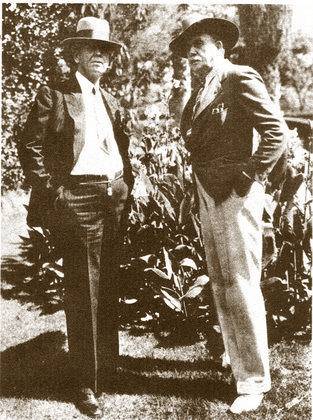
During 1931, Emmett was diagnosed with diabetes mellitus, and in 1932 his health started to fail him. He retired from construction business and concentrated more on his writing stories for Western magazines. He met with a Californian writer and historian Frank F. Latta, and this resulted in a friendship that would last for the rest of his life.
A letter from Emmett to Latta:
DEAR MR LATTA:
I AM VERY SORRY IT WILL BE IMPOSSIBLE FOR ME TO COME TO TULARE, OWING TO MY PHYSICAL CONDITION.
YESTERDAY I MADE A LITTLE TEST BY GOING ON A TWO-HUNDRED MILE TRIP WITH A FRIEND AND LAST NIGHT I WAS SO WEAK I COULD NOT HAVE GONE TEN MILES FURTHER.
I HAD INTENDED COMING UP NEXT THURSDAY BUT MY TRIAL YESTERDAY MAKES IT OUT OF QUESTION.
IF YOU COULD COME DOWN AND JUST BRING A FEW PHOTOS AND ANY WRITING YOU HAVE ON THE SUBJECTS WE HAVE TALKED ABOUT IT PERHAPS WOULD SUFFICE.
WRITING FOR BIG PROFITS SEEMS TO BE A PECULIAR PROCESS. FIRST ONE MUST PRODUCE GOOD MATERIAL. THEN IT SEEMS THAT ONE FIRST HAS TO HAVE A REPUTATION BEFORE HE CAN HAVE A SALE AND THEN HE CANNOT HAVE A SALE WITHOUT A REPUTATION.
BUT BY YOU AND I TIEING IN TOGETHER I FEEL SURE I CAN PUT YOUR NAME ON THE TONGUES OF HALF THE POPULATION OF THE COUNTRY, AND THAT IS WHAT IT TAKES TO BE ABLE TO DEMAND THE PRICE.
IF YOU CONTEMPLATE COMING DOWN SOON DROP ME A LINE SO I WILL BE AT HOME.
WITH KINDEST REGARDS I REMAIN
YOURS TRULY
Emmett Dalton
4350 PRICE ST
HOLLYWOOD,CALIF
This excerpt from Emmett’s letter to Mr. Virgil Y. Russell of Casper, Wyoming, April 1, 1934, gives further insight into his health problems: “ DEAR PROFESSOR: IT HAS BEEN SELDOM I HAVE BEEN SO,IN YEARS,THAT I COULD NOT ANSWER MY LETTERS BUT NATURAL CONDITIONS SEEM TO HAVE GOTTEN THE BETTER OF ME. I HAVE BEEN ON THE ’BUM’ FOR FOUR OR FIVE YEARS. CAN’T DIE NOR GET WELL, BUT IN THE LAST FEW MONTHS I SEEM TO BE GETTING BETTER…”
San Mateo Times, July 16, 1932: Two studios are nibbling at the film rights to “When the Daltons Rode,” a story of the famous outlaw band, written by a surviving member, Emmett Dalton.
Los Angeles Times, July 5, 1934: Exploits that made news and history during the last few decades were retold yesterday at a gathering of men in the Mission Village at 5675 West Washington Boulevard. It was a strange sort of Fourth of July reunion of men both bold and bad in the days gone by. Some are now in motion pictures and some in public service.
The whole group were entertained by some fast-disappearing redskins of the west.
Among those present was Jim Thorpe, Chief Many Treaties of the Blackfoot tribe of Montana; Red Larkin, Emmett Dalton and Frank Murphy.
Emmett was still going over old ground, forever working on “his story”. In a letter written to an editor, C. W. Mowre, on November 26, 1934, he wrote: …“I WILL TRY AND DO AS YOU SUGGEST WHEN WRITING MY COFFEYVILLE STORY. ANY SUGGESTIONS YOU CARE TO MAKE WILL BE GLADLY RECEIVED…”
Evidently he was also now considered as a bit of a bore because of his boastful Dalton stories. He had filled several scrapbooks with clippings of the Dalton gang exploits. With his poor health and inability to be active, he seemed to sink into his outlaw persona with near tragic consequences.
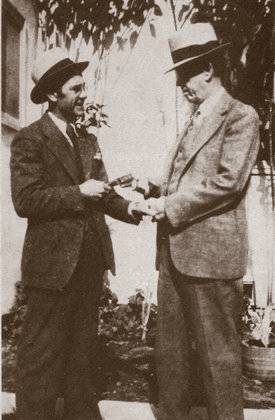
On February 6, 1935, Emmett presented Chuck Martin, his friend and fellow writer, with his old single action Colt .44, which he had carried before the Coffeyville raid. This was done in a way of thanks, for earlier that day Martin had saved Emmett from a heap of trouble.
Martin, having arranged with a friend to create a casual meeting betweem Emmett and a man claiming to be Bill Stiles of Jesse James gang, tells what happened: ” ...I saw my friend turn the corner a block away with a little weazened old man. Emmett glanced at the oncomers casually. Then his eyes narrowed. He stiffened, recognized this other old outlaw, and Emmett went into action. I believe he was about sixty-three at the time. He clawed back the tail of his coat, reached for the back of his pants, and came out holding a cocked six-shooter. I caught him around the waist with both arms, pinned his arms to his sides, and yelled to beat hell. Emmett was struggling and pitching like a bucking bronc with a tree-cat on his back. Bill Stiles looked up and recognized his old enemy. Eighty years old, but he took off like a jack rabbitt."
Why carry a gun when going for a short stroll in Hollywood? Was the line between reality and the outlaw days becoming so blurred that he had fitted himself into the legend he had become? This incident sobered him up some, and he got rid of the gun. (photos taken by Julia)
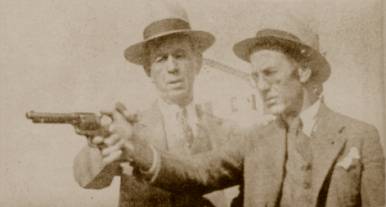
The Oklahoman, Feb. 27, 1935: LOS ANGELES, Feb. 26. - (AP) - Emmett Dalton, of the old Dalton gang of train and bank robbers, sued the Columbia movie studio in federal court Tuesday, charging unfair competition in a recent Columbia film release “Beyond the Law.” He asks $50,000 damages.
Dalton, who reformed long ago and has been living quietly in Hollywood, asserts he wrote and copyrighted in 1918 an original story “Beyond the Law,” and has produced and copyrighted a motion picture of the same title. Since the release of the Columbia film, however, the public has become confused as to which picture is which, he contends.
Abilene Morning News, Sept. 20, 1935: LOS ANGELES, Sept. 19. - A deep hatred, born in 1892 was forgotten today when Emmett Dalton and charles Gump met.
Maybe, the names don’t mean much to the present generation, but they were once in the news…
It was Charles Gump who sounded the death note for the Dalton gang. He witnessed their arrival, sounded the alarm and mobilized the townsmen.
They met last night - both gray-haired and not so quick on the trigger finger anymore - and shook hands.
“Time is a great healer,” they said.
They plan reunion again on Oct. 5, the anniversary of one of the bloodiest street battles of the west.
San Antonio Express, Oct. 8, 1935: HOLLYWOOD, Calif., Oct. 7. - Charles Gump, one of the citizens of Coffeyville, Kan., who battled the Dalton brothers when they raided the town 43 years ago, described them here today as “courageous men.”
“They were not like these little city ‘rats’ that shoot you in the back when you aren’t looking,” said Gump.
He had met Emmett Dalton, who lives in a modest bungalow here, and they talked over old times. Gump, now a retired citizen of Coffeyville, encountered Emmett and Bob Dalton as they sought to escape from the holdup of the Coffeyville First National Bank. He was shot through the right hand and carries the bullet scar today…
“The Dalton boys were very popular previous to their Coffeyville raid,” said Gump. “They had been deputy United States marshals and their word was 100 per cent. Their name has been growing in popularity ever since.
“After Emmett Dalton wrote his book ‘When the Daltons Rode,’ he became known all over the world. What makes him stand out above others is that he took his punishment, almost 15 years in prison, like a man and when he came out he never went back to outlawry. I think he is now one of our best citizens.
“The Daltons were courageous men. Bob Dalton, their leader, was an expert shot. I do not think he wanted to kill me when he shot at me 43 years ago. I think he just meant to disable me by shooting me through the hand.”
The Los Angeles Times, Nov. 1, 1935: Emmett Dalton, only survivor of the Dalton gang of bank robbers after their pitched battle forty-three years ago this month with an embattled citizenry at Coffeyville, Kan., yesterday appeared in court on the side of the law.
Dalton, now 64 years of age, went to Municipal Judge Taplin’s court to appear as a witness for the State in its prosecution of Dr. William D. Noland, 3944 Wilshire Boulevard, charged with violation of the California Chiropractic Act.
Dalton’s testimony was not necessary, however, as Judge Taplin found Noland guilty on two counts of using the abbreviation “Dr.” before his name without the chiropractic symbol following sa required by law. Sentence was deferred until November 12 when a plea for peobation will be heard.
Dalton was a patient of the defendant for nearly a year following a stroke and would have testified for the prosecution if necessary, Deputy City Prosecutor Louis Baboir said.
Noland had been charged in a third count with advertising himself as a bloodless surgeon but this count was dismissed.
Emmett Dalton has been living a quiet life, making his living largely by writing fiction, scenarios and articles. He is the author of two books. He lives at 4350 Price street.
(See Emmett's Price Street home here.)
The Los Angeles, May 2, 1936: Efforts of Emmett Dalton to win damages from Columbia Pictures Corporation for asserted infringement of his story and motion picture “Beyond the Law” by a talking photoplay released about a year ago, failed yesterday by decision of United States District Judge McCormick.
In ruling in the defendant’s favor, Judge McCormick held that the producing corporation had not copied or pirated any part of Dalton’s story or picture which dealt with the exploits of the Dalton outlaws.
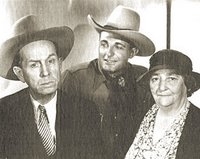
Emmett and Julia with Ray Corrigan
Oakland Tribune, Oct. 5, 1936: LOS ANGELES, Oct. 4. - (AP) - Hymns and prayer will mark an anniversary tonight for a frail white-haired man of 65 who looks like a minister.
He is Emmett Dalton, once a scourge of the middle border.
At Aimee Semple McPherson’s Angelus Temple, where he is a regular worshiper Dalton will attend the usual Monday night services, 44 years to the day since the Dalton band fought a pitched battle with officers and citizens in the town square of Coffeyville, Kan.
Emmett, youngest of the raiders survived. Eight men died.
“Since then I have never committed the slightest infraction of the laws of either God or man,” he said.
Buckshot wounds at Coffeyville and 15 years in the Kansas penitentiary before he was pardoned have broken Dalton’s health. But he has accumulated a large store of screen scenarios and stories based on the Dalton history.
From the sale of these, he said he hoped to provide for his and his wife’s future years.
The Angelus Temple is located next to Echo Park in Los Angeles (see photo). Aimee Semple McPherson was a controversial evangelist. She used theater and music to illustrate her sermons and Bible stories. This obviously was more attractive to Emmett than the traditional services that might have reminded him of "boring" church of his boyhood. It was only during this year that he started attending church services, first at a Pentecostal church on San Fernando Boulevard. Emmett was baptized at the Temple on August 27, 1936.
Emmett’s health deteriorated further the following year. When Frank Latta visited him not long before his death, Emmett had been sitting propped up in a chair, clad only in his pajamas, his body shrunken and shaking. On July 4,1937, Emmett suffered another stroke. He passed away quietly on July 13, with Julia by his side. Julia told the newspapers that Emmett would be buried in Coffeyville next to Bob, but in fact his ashes were sent to Kingfisher, Oklahoma, where his sister Leona and the undertaker buried his remains after dark in the family plot. Leona also had requested that no marker would be put on the grave before her own death.
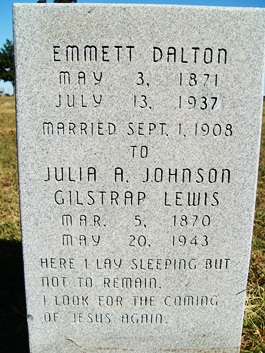
El Paso Herald-Post, July 15, 1937: …And now, at 66. Emmett Dalton is dead in Los Angeles - one of the last of the outlaw horsemen whose exploits have so large a part in our western legendry. Probably it is only an illusion of time that makes the Dalton gang seem somehow more heroic figures than the Dillingers and Baby-Face Nelsons of recent years. The old-time bad men were about as bad as men could be - and Emmett Dalton, who reformed and died respectable and respected, was one of the rare exceptions to prove the rule.
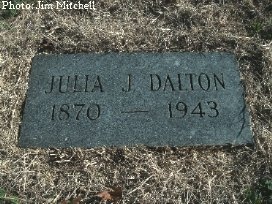
Julia died of cardiac failure at a Fresno, Cal., hospital on May 20, 1943, after suffering a ruptured appendix. She was cremated and buried in the Johnson family plot at Dewey, Oklahoma.
In going through the papers and other material I found nobody, who knew or had met Emmett, saying anything but good things about him. He comes across as a caring, considerate man with a determined and stubborn streak in him. His downfall was, like with so many young people, his wish to fit in with his crowd. Frank Latta, who knew him in his later years, wrote: "There was much to admire in Emmett. It has been the opinion of all persons interviewed that he was largely a victim of circumstances. …He was an attractive, likeable sort of fellow. One could not help but regret he had been denied the chance of success that might have been his if he never had run with the Dalton Gang." And Chuck Martin wrote: “ … and many of the old peace officers liked and respected Emmett Dalton, who, in those later years, I was proud to call my - Friend.” Both knew him possibly at his worst.
Even today, there is a lot that can be learned from his story.
Leave a message in the Guestbook.


